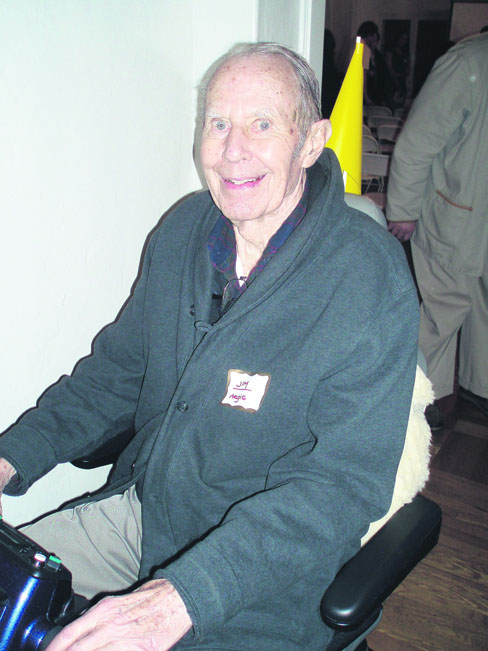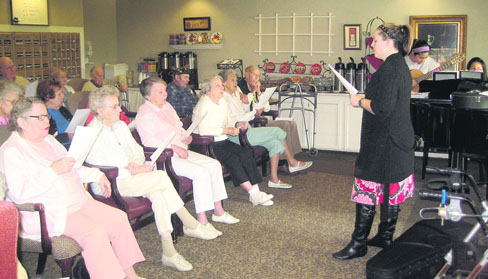 | | | Jim Burris traded his bike for an electric scooter
Photo Wendy Scheck
| | | | | | One of the most difficult times in a child's life can be when a parent can no longer care for themselves. Not only are adult children faced with the task of finding care for elderly parents, handling finances, and dealing with existing housing, but they must start an awkward conversation that can shift the parent/child role.
 Anne Rosenthal, a geriatric care manager at Eldercare Services, says to try to frame your discussions in a caring way, underscoring your concern for a parent, mentioning a problem you have noticed, and how your discussion is a way for you to gain peace of mind and to keep your parent safe.
Anne Rosenthal, a geriatric care manager at Eldercare Services, says to try to frame your discussions in a caring way, underscoring your concern for a parent, mentioning a problem you have noticed, and how your discussion is a way for you to gain peace of mind and to keep your parent safe.
 Often adult children are alerted that there might be a problem when small changes start happening.
Often adult children are alerted that there might be a problem when small changes start happening.
 "Bills that go unpaid, throwing out important mail while keeping things like sweepstakes letters, personal hygiene changes (men going unshaven and women forgetting hair appointments), forgetting things like doctor's appointments or mixing up dosages of medication are the most common red flags," says Rosenthal.
"Bills that go unpaid, throwing out important mail while keeping things like sweepstakes letters, personal hygiene changes (men going unshaven and women forgetting hair appointments), forgetting things like doctor's appointments or mixing up dosages of medication are the most common red flags," says Rosenthal.
 Changes in mobility or a sudden illness are another catalyst.
Changes in mobility or a sudden illness are another catalyst.
 Jim Burris, 89, had lived in Lafayette with his wife, Lois, for 56 years. An avid cyclist who even cycled 80 miles when he was 80 years old, Burris took a fall from his bike and could no longer keep his balance. With his wife ill, his children approached the couple about assisted living.
Jim Burris, 89, had lived in Lafayette with his wife, Lois, for 56 years. An avid cyclist who even cycled 80 miles when he was 80 years old, Burris took a fall from his bike and could no longer keep his balance. With his wife ill, his children approached the couple about assisted living.
 "Our kids gave us a good outline of the way things were going," Burris says. "The kids knew about assisted living programs and we'd go to different facilities and have lunch."
"Our kids gave us a good outline of the way things were going," Burris says. "The kids knew about assisted living programs and we'd go to different facilities and have lunch."
 Burris and his wife moved to Aegis of Moraga two years ago, and although his wife has since passed away, Burris now spends a lot of time gardening, singing in the chorus, and trekking in his scooter (which he traded for his bicycle after he could no longer ride).
Burris and his wife moved to Aegis of Moraga two years ago, and although his wife has since passed away, Burris now spends a lot of time gardening, singing in the chorus, and trekking in his scooter (which he traded for his bicycle after he could no longer ride).
 "I like the trails close by. I go all over the countryside in that scooter," he says. "It has an electric motor and two gel batteries. I go to Chamber and Town Council meetings, and have even been up on Mulholland Hill - you can see all the countryside up there." Burris even drove his scooter to Lafayette to visit a friend who lives by Stanley School. "I like to keep busy," he says.
"I like the trails close by. I go all over the countryside in that scooter," he says. "It has an electric motor and two gel batteries. I go to Chamber and Town Council meetings, and have even been up on Mulholland Hill - you can see all the countryside up there." Burris even drove his scooter to Lafayette to visit a friend who lives by Stanley School. "I like to keep busy," he says.
 Moraga resident Wendy Scheck's parents, Jack and Joan Wuerth, were not as enthusiastic about the prospect of assisted living. "They wanted to be independent; no old people's homes and neighborhoods," Scheck says.
Moraga resident Wendy Scheck's parents, Jack and Joan Wuerth, were not as enthusiastic about the prospect of assisted living. "They wanted to be independent; no old people's homes and neighborhoods," Scheck says.
 Rosenthal says people often have unrealistic expectations about what it's like to move from home. "They think assisted living will be very restrictive, with an older person stuck in a cookie-cutter setting, or that if they let caregivers into their home, they'll take over," she says. "Actually, there are personal rights and resident bills of rights mandating privacy, access to a telephone, and dietary preferences, among other things (which can be found on the Internet). No one is required to participate in anything they don't want to."
Rosenthal says people often have unrealistic expectations about what it's like to move from home. "They think assisted living will be very restrictive, with an older person stuck in a cookie-cutter setting, or that if they let caregivers into their home, they'll take over," she says. "Actually, there are personal rights and resident bills of rights mandating privacy, access to a telephone, and dietary preferences, among other things (which can be found on the Internet). No one is required to participate in anything they don't want to."
 Agencies like Eldercare Services are very careful about who they hire for in-home care, Rosenthal adds. "People are not only experienced, reliable and honest, but they treat their clients with honor and respect."
Agencies like Eldercare Services are very careful about who they hire for in-home care, Rosenthal adds. "People are not only experienced, reliable and honest, but they treat their clients with honor and respect."
 After three years of dealing with various health problems on their own (and Joan acting as caregiver for Jack) in a small town on the east coast, the Wuerths agreed to have a chef come into their home once a day, but refused any other help. But when Joan broke her pelvis, that type of help was no longer enough.
After three years of dealing with various health problems on their own (and Joan acting as caregiver for Jack) in a small town on the east coast, the Wuerths agreed to have a chef come into their home once a day, but refused any other help. But when Joan broke her pelvis, that type of help was no longer enough.
 While most people opt to stay at home as long as possible, Rosenthal says in-home care is a good option if you need it fewer than 8 hours a day. "If people use over 8 hours a day for care, it might be more cost effective to look at shift or live-in rates, which may be a better value."
While most people opt to stay at home as long as possible, Rosenthal says in-home care is a good option if you need it fewer than 8 hours a day. "If people use over 8 hours a day for care, it might be more cost effective to look at shift or live-in rates, which may be a better value."
 "It cost $500 a day for 24-hour care (one person at night; two during the day)," Scheck says. "It happened really quickly; then all of a sudden we were dealing with their finances. My mom was messing up her medication; the caregivers were even messing it up. We basically needed a manager to manage the caregivers. My siblings and I didn't want to move them to an assisted living facility, but the situation became unmanageable."
"It cost $500 a day for 24-hour care (one person at night; two during the day)," Scheck says. "It happened really quickly; then all of a sudden we were dealing with their finances. My mom was messing up her medication; the caregivers were even messing it up. We basically needed a manager to manage the caregivers. My siblings and I didn't want to move them to an assisted living facility, but the situation became unmanageable."
 Since Scheck was told the most important thing when selecting a facility is that at least one family member lives close by, she decided to move them to California and signed them up for a trial run at Aegis of Moraga. "We kept their house, and I told them if they didn't like it, they could leave," Scheck says. "We paid the association fee, but if you leave before 90 days, you get some of that back. Once they were there, their health stabilized."
Since Scheck was told the most important thing when selecting a facility is that at least one family member lives close by, she decided to move them to California and signed them up for a trial run at Aegis of Moraga. "We kept their house, and I told them if they didn't like it, they could leave," Scheck says. "We paid the association fee, but if you leave before 90 days, you get some of that back. Once they were there, their health stabilized."
 The Wuerths now sit at a table for meals with Burris and several others. "They really enjoy the interaction with the people," Scheck says.
The Wuerths now sit at a table for meals with Burris and several others. "They really enjoy the interaction with the people," Scheck says.
 Burris enjoys the company as well. "Jack and another fellow we just lost both went to Princeton and another went to Harvard," says Burris, who attended UC Berkeley. "We're not a bunch of dummies," he added with a chuckle.
Burris enjoys the company as well. "Jack and another fellow we just lost both went to Princeton and another went to Harvard," says Burris, who attended UC Berkeley. "We're not a bunch of dummies," he added with a chuckle.
 What's next for Burris? "I want to learn to play the ukulele."
What's next for Burris? "I want to learn to play the ukulele."
 (For more information about how to talk to parents, visit the AARP Web site at: www.aarp.org.)
(For more information about how to talk to parents, visit the AARP Web site at: www.aarp.org.)

|

